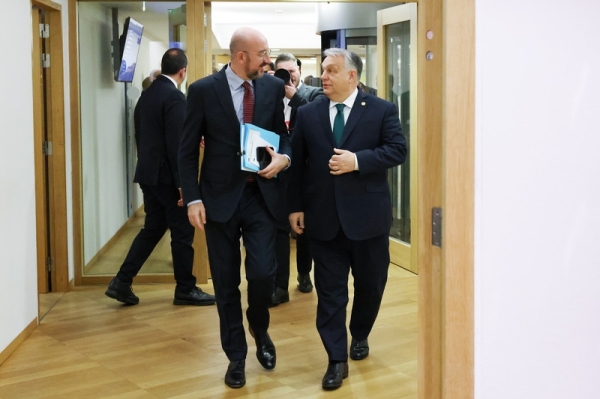Orbán emerges claiming victory — while EU delivers Ukraine aid
While his demands for an annual right to veto the disbursement of funds to Ukraine were rejected by the other EU-26, Hungarian prime minister Viktor Orbán still emerged from Thursday’s summit in Brussels claiming victory.
"Mission accomplished. Hungary’s funds will not end up in Ukraine and we have a control mechanism at the end of the first and the second year," Orbán said on X, formerly Twitter, after the summit (1 February).
Hungary previously blocked all compromises but finally — and in fact rapidly — agreed to the €50bn four-year aid package to Ukraine.
His demands for annual veto rights were, however, unacceptable to the majority of EU leaders.
Instead, the compromise relies on having an annual report prepared by the EU Commission on the implementation of the so-called Ukraine Facility. And, if needed, the EU Council could unanimously call on the commission to have a review in two years, according to the summit conclusions.
The text also included a reference to the rule-of-law conditionality mechanism, which stresses that such a tool must "be proportionate to the impact of the breaches of the rule of law".
While EU diplomats say there are no legal implications on recalling the well-functioning of a regulation already agreed upon and established, the reference is still raising eyebrows.
The reference seems "murky" as it somehow suggests that the EU executive has not been doing a fair and objective job regarding the blockade of funds to Hungary, said Zsuzsanna Végh, a researcher from the think tank European Council on Foreign Relations.
"Viktor Orbán can and will spin the three additions as if he was successful in his demands," she also said, referring respectively to the annual report, the potential review, and the line on the rule of law conditionality mechanism.
During the last few weeks, EU officials and diplomats have often been asked by journalists what they think Orbán really wants to get out of this negotiation on the €50bn for Ukraine that he blocked for weeks.
The answers vary.
While some argue that Orbán wanted a discussion with EU leaders to bring back to the table the question of whether Europe has the right policy approach for Ukraine, others say that not even Hungarian diplomats know what Orbán actually wanted.
But it is clear that his efforts are focused on unblocking the frozen funds from Brussels.
"He wants European taxpayers’ money, that is what he really wants, money to keep up with his regime," Hungarian centre-left opposition MP Ágnes Vadai told EUobserver.
To this end, Orbán seems ready to block anything and everything — from Ukraine’s financial aid, to military assistance, Sweden’s Nato bid or, as many predict, even the reappointment of EU Commission president Ursula von der Leyen.
As one EU senior diplomat said ahead of the extraordinary summit, Orbán was using the Ukraine aid negotiations to "blackmail" EU institutions and EU countries and keep leverage for the future since he actually knows the money is not coming.
For years, EU leaders haven’t been able to deal with Orbán — and for some, it is even too late, which is prompting calls to advance on the Article 7 procedure.
"Blackmail and blockade have become the norm and will continue to be at every [European] Council summit until leaders recognise that giving Viktor Orbán a veto is a carte blanche for him to use it against the EU’s interests," said German green MEP Terry Reintke. "It’s time for the member states to move forward on the Article 7 procedure and strip Orbán of his voting rights."
In the past, he always managed somehow to find allies here and there.
Orbán believed he had a potential partnership with allies in the Italian far-right time minister Georgia Meloni and Slovakia populist leader Robert Fico — but even Rome and Bratislava gave the green light to the €50bn air to Ukraine in December.
But he is now more isolated than ever. "He has no partners or friends," Vadai said.
In December, the EU commission unblocked €10bn of cohesion funds for Hungary — prompting the European Parliament to call for a review of the legality of the decision with the aim of taking the commission to court.

